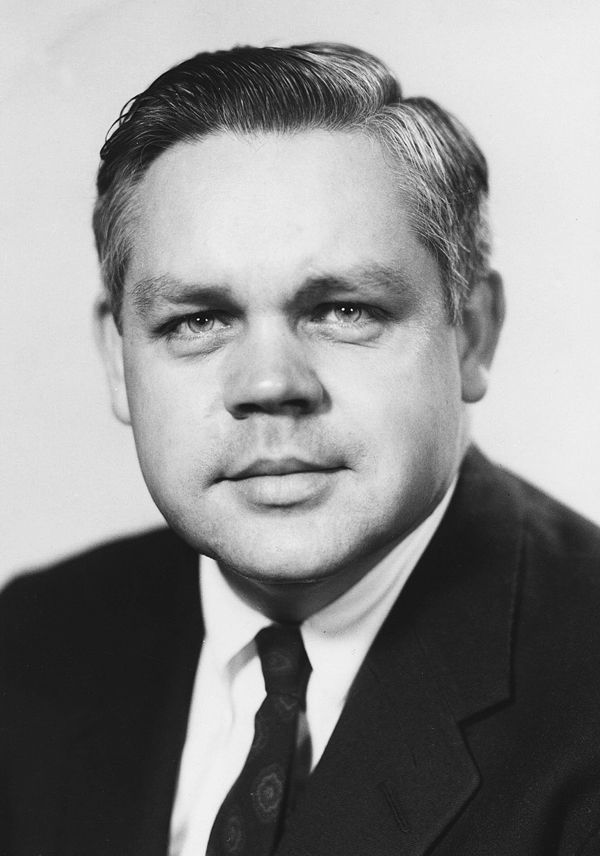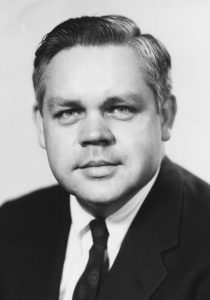Dick Allen
Jazz historian Dick Allen was instrumental in the founding of the William Ransom Hogan Jazz Archive at Tulane and was a curator of the archive from 1958 to 1980.

Courtesy of Tulane University, William Ransom Hogan Archive of New Orleans Jazz
Richard "Dick" Allen. Unidentified
Cichard “Dick” Allen was a Vieux Carré “character” for more than five decades, even though he was not a native of New Orleans. Many people knew him as a familiar face on the Freret Street bus. Yet Allen was also one of the first oral historians to document the history of jazz. He was a founder and curator of Tulane University’s Archive of New Orleans Jazz, known today as the William Ransom Hogan Jazz Archive, and one of the founders of the New Orleans Jazz & Heritage Festival. He also wrote numerous articles and liner notes, and acted as a consultant for many organizations, including the Smithsonian Institution.
Richard Binion Allen was born in Milledgeville, Georgia, on January 29, 1927 to Edwin Whitaker Allen and Catherine T. Allen. He came from a long line of psychiatrists who ran a sanitarium there. As he was fond of saying, “It was just a small insane asylum, but it was always home to me.” Allen was educated at the Georgia Military College in Milledgeville and Princeton University in New Jersey before serving in the Navy during World War II where he was stationed in Mobile, Alabama. During this period, he began making trips to New Orleans in search of jazz.
In 1949, he relocated to the Crescent City where he remained until 2003. In the 1950s the city remained racially segregated and Allen, a white Southerner with an abiding interest in African-American music, sometimes found himself at odds with the law. This did not stop him for doing what he wanted to do, which was to hear as much jazz as possible and become friends with the musicians who made it. His interviews are particularly valuable to scholars precisely because he earned the trust and respect of his informants. He made them feel relaxed, and they opened up to him, allowing him into their world.
In 1958, Allen approached the chair of Tulane’s history department, William Ransom Hogan, about using oral history interviews with New Orleans jazz pioneers in his master’s thesis. Excited by the prospect, Hogan wrote a grant to the Ford Foundation to fund the fieldwork. The master’s thesis was soon forgotten, but a research center took its place; Allen worked as an associate curator, assisting the sage jazz historian William Russell. In 1965 Allen became curator, a position he held until 1980. Together the two men conducted two thousand reels of taped interviews, the largest collection of jazz oral history in existence.
In his line of work, Allen got to meet some pretty interesting people. He told of getting to know Stanley Kubrick before he became famous–when the budding filmmaker was a photographer assigned to a Look magazine article on George Lewis in 1950. Not many people know this, but Kubrick was a good traditional jazz drummer. Whitney Balliett, the venerable jazz critic for The New Yorker, had Allen as his guide when he toured the city’s jazz haunts in 1967. In a piece titled “Mecca, Louisiana,” he likened Allen to Virgil and called him “the Curator of New Orleans jazz itself.” Everyone thought of Allen as a “people person,” but that did not mean he was not fond of animals, too, except in one case. It seems that one of his good friends took it upon himself to play a little practical joke on Allen. While Allen was at work one day, the friend inserted a goat into Allen’s apartment on Bourbon Street. After the animal had consumed all the “goat food” that had been left out, he began devouring every book in sight. When Allen returned home that evening, his place was a complete mess, totally ransacked in the goat’s “quest for knowledge.” In order to get a handle on the situation, Allen coaxed the beast onto the balcony so he could clean up. Allen was subsequently arrested for harboring a farm animal within city limits, which was apparently a taboo, even in the Quarter.
Allen certainly led a colorful life, and his legacy at the Hogan Jazz Archive will keep jazz scholars busy for generations. He defied the expectations of his family, who wanted him to become a psychiatrist, and created an American dream for himself that made sense only in New Orleans. When Allen passed at the age of eighty on April 12, 2007, his cousins requested a photograph. The Hogan Jazz Archive sent one of him with Paul Barbarin, Billy Strayhorn, and Duke Ellington in which they are all smiling like Cheshire cats.
Adapted from Louisiana Cultural Vistas Magazine, Summer 2010.
